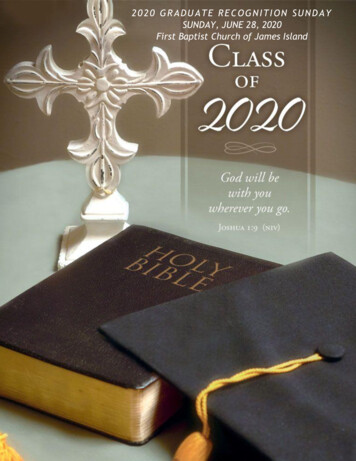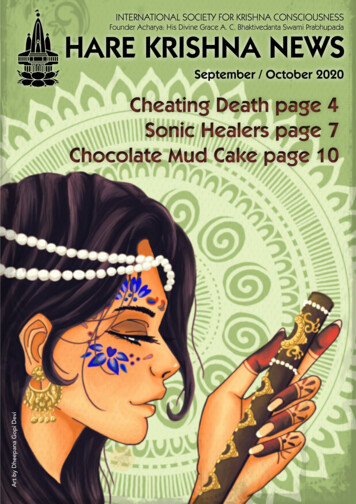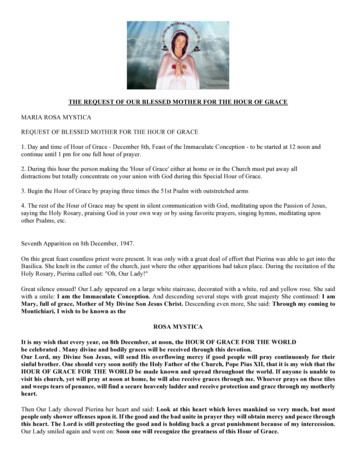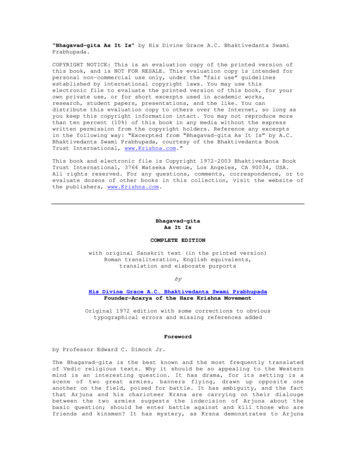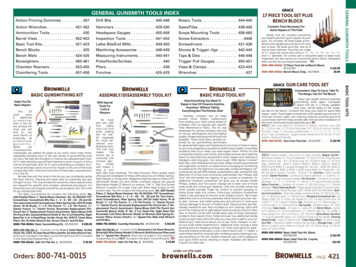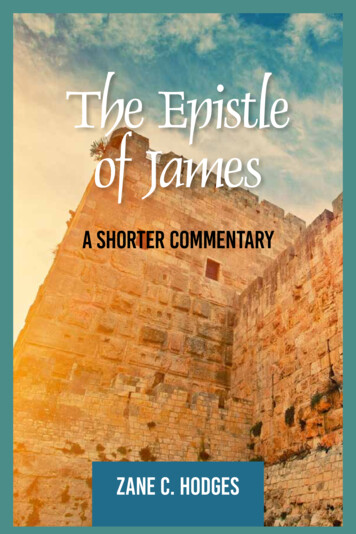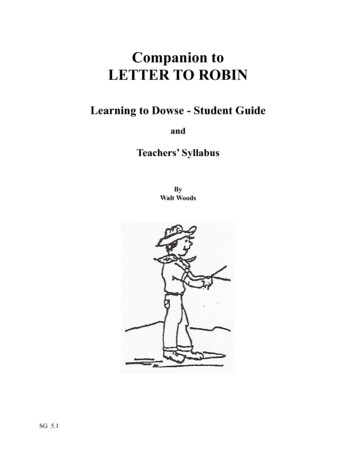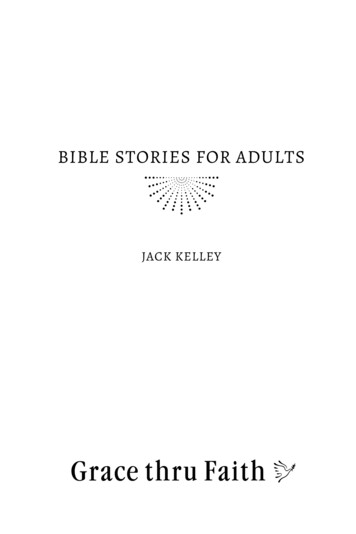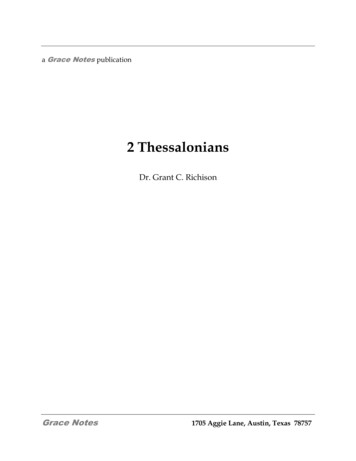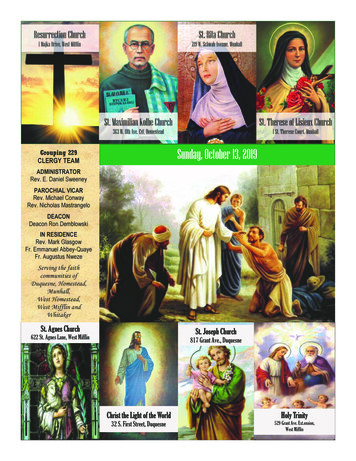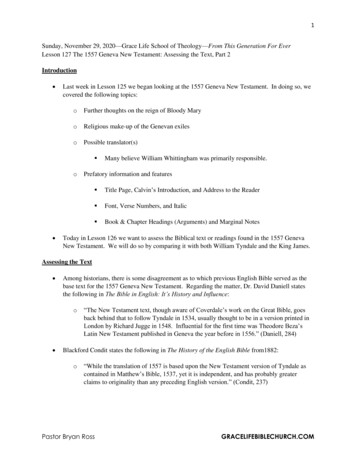
Transcription
1Sunday, November 29, 2020—Grace Life School of Theology—From This Generation For EverLesson 127 The 1557 Geneva New Testament: Assessing the Text, Part 2Introduction Last week in Lesson 125 we began looking at the 1557 Geneva New Testament. In doing so, wecovered the following topics:oFurther thoughts on the reign of Bloody MaryoReligious make-up of the Genevan exilesoPossible translator(s) o Many believe William Whittingham was primarily responsible.Prefatory information and features Title Page, Calvin’s Introduction, and Address to the Reader Font, Verse Numbers, and Italic Book & Chapter Headings (Arguments) and Marginal NotesToday in Lesson 126 we want to assess the Biblical text or readings found in the 1557 GenevaNew Testament. We will do so by comparing it with both William Tyndale and the King James.Assessing the Text Among historians, there is some disagreement as to which previous English Bible served as thebase text for the 1557 Geneva New Testament. Regarding the matter, Dr. David Daniell statesthe following in The Bible in English: It’s History and Influence:o “The New Testament text, though aware of Coverdale’s work on the Great Bible, goesback behind that to follow Tyndale in 1534, usually thought to be in a version printed inLondon by Richard Jugge in 1548. Influential for the first time was Theodore Beza’sLatin New Testament published in Geneva the year before in 1556.” (Daniell, 284)Blackford Condit states the following in The History of the English Bible from1882:o“While the translation of 1557 is based upon the New Testament version of Tyndale ascontained in Matthew’s Bible, 1537, yet it is independent, and has probably greaterclaims to originality than any preceding English version.” (Condit, 237)Pastor Bryan RossGRACELIFEBIBLECHURCH.COM
2 Meanwhile, J.I. Mombert states it somewhat differently in his 1883 work English Versions of theBible:o“The Genevan New Testament of 1557 is Tyndale’s version, collated with the GreatBible, which in the New Testament is likewise based on that version, and a strong leaningon Beza, with the result of a substantial agreement with Tyndale, a less frequentdifference from him and agreement with the Great Bible, and an occasional differencefrom both and agreement with Beza.” (Mombert, 242) While it is interesting to consider different perspectives on this matter, in the end it does notmatter. The bottom line is that the 1557 Geneva New Testament is fundamentally Tyndallian.Whether the base text was the Matthew’s Bible from 1537 or the Great Bible from 1539 is of noultimate consequence since both of those editions were Tyndallian as well. Once again, wecannot overstate the influence of William Tyndale. His work looms large over all these pre-1611English Bibles as it does with the King James itself. As I stated last week in Lesson 125, I have not been able to locate a PDF of the 1557 GenevaNew Testament. Therefore, my access to the text has been through Samuel Bagster’s 1841 workthe English Hexapla which presents the 1557 New Testament in its entirety in parallel columnsalong with the Wycliffe (1380), Tyndale (1534), Cranmer (1539), Rheims (1582), and Authorized(1611). There is disagreement over the wisdom of Bagster’s choice to include the Genevan text from1557 instead of the one from 1560 in his English Hexapla. Mombert states the followingregarding the matter:o So, according to Mombert, Bagster should have used the 1560 text instead of the 1557 text in hiswork. In Momberts’s view, only the marginal notations of 1557 text are of “critical importance”and they do not appear in Bagster’s Hexapla. Professor Daniell offers a much differentperspective:o “Before giving a few extracts from this the first Genevan New Testament of 1557, Icannot but deplore the mistaken judgment of the reproduction of the text of that edition inBagster’s Hexapla in lieu of that of 1560, first because the latter, on account of itsintrinsic superiority possesses a critical value in which the first is deficient, and secondly,because the critical importance which the version of 1557 does possess is derived fromthe annotations, which Bagster’s reprint are omitted.” (Mombert, 241-242)“Bagster’s choice of this text [1557] over the New Testament from the complete 1560Geneva Bible has been regarded as odd: but his decision was sound, for so much that waslater standard (not only in the KJV, for example) first appeared in 1557.” (Daniell, 284)While I understand Mombert’s point, I side with Daniell in this discussion. My interests lie intrying to ascertain when a given English reading first appeared in an English Bible. Bagster’s useof the 1557 grants us access to this text which might otherwise have been hidden from view.Pastor Bryan RossGRACELIFEBIBLECHURCH.COM
3 The following examples were selected to give us a flavor of how the Genevan text compares withthe text of William Tyndale and the King James Bible. Adopting a standard format for doing thiswas a bit tricky since each author used a slightly different methodology. The first grouping ofexamples are taken from the works of Dr. David Daniell and Blackford Condit. In the tables thatfollow, underlined words indicate wording changes from the preceding translation listed in thetable. Please also note that I have updated the spelling of words wherever possible for increasedreadability.Matthew 6:9-13Tyndale (1534)Our father which art in heavenhallowed be thy name. Let thykingdom come. Thy will befulfilled as well in earth as it isin heaven. Give us this day ourdaily bread. And forgive us ourtrespasses even as we forgiveour trespassers. And lead us notinto temptation: but deliver usfrom evil. For thine is thekingdom and the power and theglory for ever. Amen.Geneva New Testament (1557)9) . . . Our father which art inheaven, hallowed be thy name.10) Let thy kingdom come. Thywill be done even in earth as it isin heaven.11) Give us this day our dailybread.12) And forgive our debts, evenas we forgive our debtors13) And lead us not intotemptation, but deliver us fromevil. For thine is the kingdom,and the power, and glory forever Amen.King James (1611)9) . . . Our father which art inheaven, hallowed be thy name.10) Thy kingdom come. Thywill be done, in earth, as it is inheaven.11) Give us this day our dailybread.12) And forgive us our debts, aswe forgive our debtors.13) And lead us not intotemptation, but deliver us fromevil: For thine is the kingdom,and the power, and the glory, forever, Amen.Geneva New Testament (1557)8) Either what woman havingten pieces of silver, if she loseone, doth not light a candle, andsweep the house, and seekdiligently till she find it?King James (1611)8) Either what woman havingten pieces of silver, if she loseone piece, doth not light acandle, and sweep the house,and seek diligently till she findit?9) And when she hath found it,she calleth her friends and herneighbors together, saying,Rejoice with me, for I havefound the piece which I had lost.10) Likewise I say unto you,there is joy in the presence ofthe Angels of God, over onesinner that repenteth.Luke 15:8-10Tyndale (1534)Either what woman having tengroats, if she lose one, doth notlight a candle, and sweep thehouse, and seek diligently, tillshe find it? And when she hathfound it she called her loversand her neighbors saying:Rejoice with me, for I havefound the groat which I had lost.Likewise I say unto you, joy ismade in the presence of theangels of God over one sinnerthat repenteth. 9) And when she hath found it,she calleth her friends, and herneighbors, saying, Rejoice withme, for I have found the piecewhich I had lost.10) Likewise, I say unto you,joy is made in the presence ofthe angels of God, over onesinner that converteth.Regarding the comparison between Tyndale and the Geneva New Testament, Dr. Daniell statesthe following:Pastor Bryan RossGRACELIFEBIBLECHURCH.COM
4o“The dependance on Tyndale is clear: but so are the changes, from ‘ten groats’ to ‘tenpieces of silver’, and from ‘her lovers’ to ‘her friends’ (the older ‘lovers’ did not have thesexual sense in Tyndale). Though the Rheims New Testament of 1582, on which it has sooften been said that the KJV revisers heavily relied, restored ‘groats’, KJV itself gave‘pieces of silver’ from ‘1557.’ . . . KJV followed Tyndale’s ‘sinner that repenteth’ ratherthan ‘1557’’s ‘sinner that converteth,’ strikingly not taking the Rheims ‘sinner that dothpenance’.” (Daniell, 285)Luke 18:1-5Tyndale (1534)And he put forth a similitudeunto them, signifying that menought always to pray, and not tobe weary saying: There was ajudge in a certain city, whichfeared not God neither regardedman. And there was a certainwidow in the same city, whichcame unto him saying: avengeme of mine adversary. And hewould not for a while. Butafterward he said unto himself:though I fear not God, nor carefor man, yet because this widowtroubleth me, I will avenge herlest at the last she come and hagon me. Geneva New Testament (1557)1) And he put forth a similitudealso unto them, to this end thatthey ought always to pray, andnot wax faint.2) Saying there was a Judge in acertain city, which feared notGod, neither reverenced man.3) And there was a certainwidow in the same city, whichcame unto him saying, Do mejustice against mine adversary.4) And he would not for a longtime: but afterward he said withhimself, Though I fear not God,nor reverence man.5) Yet because this widowtroubleth me, I will do her right,lest at the last she come andmake me weary with herimportunity.King James (1611)1) And he spake a parable untothem, to this end, that men oughtalways to pray, and not to faint,2) Saying, There was in a city aJudge, which feared not Godneither regarded man.3) And there was a widow inthat city, and she came untohim, saying, Avenge me of mineadversary:4) And he would not for a while.But afterward he said withinhimself, Though I fear not God,nor regard man,5) Yet because this widowtroubleth me, I will avenge her,lest by her continually coming,she weary me.Dr. Daniell offers the following analysis for Luke 18:1-5:o“KJV kept the first italics, to this end, but not the others, going back to Tyndale’s ‘awhile’. Tyndale’s ‘hag’ did not survive, though it is recorded in OED (Hag, v.2 3.), ‘tofatigue, tire out’ . . . The ‘importunity of ‘1557’ gave the parable its later title, ‘Theimportunate widow:’. . .” (Daniell, 285-286)I Corinthians 13: 1-13Tyndale (1534)Though I spake with the tonguesof men and angels and yet hadno love I were even as soundingbrass: or as a tinkling Cymbal.And though I could prophesyand understood all secretes andall knowledge: yea if I had allfaith so that I could movePastor Bryan RossGeneva New Testament (1557)1) Though I speak with thetongues of men and angels, andhave not love, I am even assounding brass, or as a tinklingcymbal2) And though I could prophecy,and understand all secretes, andall knowledge; yea if I had allKing James (1611)1) Though I speak with thetongues of men & of Angels,and have not charity, I ambecome as sounding brass or atinkling cymbal.2) And though I have the gift ofprophecy, and understand allmysteries and all knowledge:GRACELIFEBIBLECHURCH.COM
5mountains out of their placesand yet had no love I werenothing. And though I bestowedall my goodness to feed ye poorand though I gave my body eventhat I burned and yet had nolove it profeteth me nothing.Love suffreth long and iscourteous. Love envieth not.Love doth not forwardlyswelleth not dealeth notdishonestly seketh not her awneis not provoked to angerthynketh not evil reioyseth notin iniquity: but reioyseth in yetruth suffreth all things belevethall thynges hopeth all thingsendureth in all things. Thoughthat prophesyinge fail othertongues shall cease) orknowledge vanysshe away yetlove falleth never away For ourknowledge is vnparfect and ourprophesyinge is vnperfet. Butwhen it which is perfect is comethen it which is vnparfet shall bedone away. When I was a childI spake as a child I understoodas a childe I imagined as a child.But assone as I was a man I putaway childesshnes. Now we sein a glass even in a darkspeakynge: but then shall we seface to face. Now I knowvnparfectly: but then shall Iknow even as I am known. Nowabideth faith hope and love eventhese three: but the chiefest ofthese is love.faith, so that I could movemountains out of their places,and yet had not love, I werenothing.3) And though I bestow all mygood to feed the poor, andthough I give my body that I beburned, and yet have not love, itprofiteth me nothing4) Love suffereth long, iscourteous; love envieth not, lovedoth not boast itself, swellethnot.5) Disdaineth not asunbeseeming, seeketh not herown things, is not provoked toanger, thinketh not evil6) Rejoiceth not in inquity, butrejoiceth in the truth.7) Suffereth all things, believethall things, hopeth all thingsendureth all things.8) Love doth never fall away,though that both prophesiesshall be abolished, and tonguesshall cease, and learning shallvanish away9) For we learn in part, and weprophesy in part,10) But when that which isperfect is come, then that whichis in part shall be done away.11) When I was a child, I spakeas a child, I understood as achild, I thought as a child, butassone as I was a man, I putaway childish things.12) For now we see in a glass,and in a dark speaking but thenshall we see face to face Now Iknow in part, but then shall Iknow even as I am known.13) Now abideth faith, hope,and love, even these three, butthe chiefest of these is love.and though I have all faith, sothat I could remove mountains,and have not charity, I amnothing.3) And though I bestow all mygoods to feed the poor, andthough I give my body to beburned, and have not charity, itprofiteth me nothing.4) Charitie suffereth long, and iskind: charity enuieth not: charityvaunteth not it self, is not puffedup,5) Doeth not behave it selfunseemly, seeketh not her own,is not easily provoked, thinkethno evil,6) Reioyceth not in iniquity, butrejoyceth in the truth:7) Beareth all things, believethall things, hopeth all things,endureth all things.8) Charitie never faileth: butwhether there be prophesies,they shall fail; whether there beetongues, they shall cease;whether there bee knowledge, itshall vanish away.9) For we know in part, and weprophecy in part.10) But when that which isperfect is come, then that whichis in part, shall be done away.11) When I was a childe, I spakeas a childe, I understood as achilde, I thought as a childe: butwhen I became a man, I putaway childish things.12) For now we see through aglass, darkly: but then face toface: now I know in part, butthen shall I know even as also Iam known.13) And now abideth faith,hope, charity, these three, butthe greatest of these is charity.Textual Examples Supplied by J.I. MombertPastor Bryan RossGRACELIFEBIBLECHURCH.COM
6 J.I. Mombert also provides some interesting perspective on the text of the 1557 Geneva NewTestament when compared to the earlier editions of William Tyndale and the Great Bible. SinceMombert adopts a different style and format for sharing his observations, I have decided toinclude screen shots of his work. The following images are taken from pages 242-244 of EnglishVersions of the Bible.Pastor Bryan RossGRACELIFEBIBLECHURCH.COM
7Pastor Bryan RossGRACELIFEBIBLECHURCH.COM
8 From these two passages i.e., Luke 1 and Galatians 1, Mombert concludes the following:o “These two examples show very clearly, what any one may verify by examination ofother passages, the Genevan Version of 1557 is substantially a revision of Tyndale.”(Mombert, 244)Following this conclusion Mombert comments further on some of the peculiar or unique readingsfound in the 1557 New Testament. After doing so, he concludes with the following statement:o“Most of the passages cited display not only independent judgement, but advancedscholarship, and the general execution of the work, as well as the notes to be consideredat some length below, account for the great popularity of the different editions of theGenevan version.” (Mombert,)Interaction Between the Biblical Text and the Margin In this subpoint we want to get a sense of how the Bible interacted with the marginal notes in theGeneva New Testament. In order to accomplish this, I will present the passage as it appears inDr. Daniell’s The English Bible: Its History and Influence. The first passage is fromLuke 2:40-52:o40) And the child grew, & waxed strong in spirit, and was filled with wisdom, and thegrace of God was with him.41) And his father and mother went to Jerusalem, every year *at the feast of Easter.42) And when he was twelve years old, they went up to Jerusalem after the custom of thefeast.43) And when the feast was ended, as they returned home, the child Jesus bode still inJerusalem, unknowing to Joseph and his mother.44) For they supposed he had been in the company, and therefore went a day’s journey,and sought him among the kinsfolk, and acquaintance.45) And when they found him not, they turned back to Jerusalem, and sought him.46) And it fortuned after three days, that they found him in the temple, sitting in the midstof the “doctors, both hearing them and posing them.47) And all that heard him, marvelled at his understanding, and answers.48) And when they saw him, they were astonied: and his mother said unto him, Son, whyhast thou thus dealt with us? Behold thy father and I have sought thee with heavy hearts.Pastor Bryan RossGRACELIFEBIBLECHURCH.COM
949) Then said he unto them, How is it that ye sought me? hWist ye not that I must goabout my father’s business?50) But they iunderstood not the words that he spake to them.51) And he went with them, & and came to Nazaret: and was obedient to them: and hismother kept all these sayings in her heart.52) And Jesus increased in wisdom and stature, and in favour with God and man.In the inner margin at *, are ‘Exod. 12.c. Levi. 23.a. Deut. 26.a.’ and at “ ‘or, learnedmen.’ In the outer margin, are, at h ‘Our duty to God, is to be preferred, before father andmother’ and at i ‘For his vocation was not yet manifestly known.’The passage is clearly taken from Tyndale in 1534, with ten small changes. The biggestare that verse 43 begins, in Tyndale, ‘And when they had fulfilled the days’. In verse 47,everyone marvels ‘at his wit.’ At verses 51 and 52, ‘his mother kept all these things inher heart’ and Jesus increased ‘in wisdom and stature.’ The only marginal note is ‘Christis found disputing in the temple.’ (Daniell, 286-287) A second example of textual interaction with the margin is provided by Dr. Daniell inActs 20:6-12:o6) And we sailed away from aPhilippi, even after the days of sweet bread, and came untothem to Troas, in five days, where we abode seven days.7) And bthe first days after the Sabbath, the disciples being come together for the cbreakbread, Paul preached unto them, ready to depart on the morrow, and continued thepreaching unto midnight.8) And there were many lights in the upper chamber, where we were gathered together.9) And there sat in a window, a certain young “man named Eutychus fallen into a deepsleep, and as Paul was long preaching, he falling down for sleep, fell from the third loftdownward, and was taken up dead.10) But Paul descended, and *lay on him, and embraced him, saying, Make nothing ado,for his life is in him.11) So when Paul was come up again, and had broken bread, and eaten, he communedsufficiently, even till the dawning, and so departed.12) And they brought the boy alive, and were not a little comforted.The inner margin has ‘cto celebrate the Lord’s Supper. Cha 2.g.,’ or, boy. and * 1. King.17.d, 2 Kin.4.f. The outer margin, ‘aHe remained there these days because he had betteropportunities to teach: also the abolishing of the law was not yet known.’ ‘bWhich we callSunday. Of this place and also of the I.Cor.16.a. we gather that the Christians used tohave their solemn assemblies this day, laying aside the ceremony of the Jewish sabbath.’Again, there are a dozen small changes from Tyndale, who had in verse 6 ‘Easter holydays’; in 7 ‘On the morrow after the sabbath’; in 9, ‘Paul declared, he was the moreovercome with sleep’ and in 11, ‘and communed a long while’. The Geneva Bible of1560 made nine changes, in 6 now reading ‘unleavened bread’; in 9, ‘he overcome withsleep, fell down from the third loft’ and in 11, “Paul. . . a long while till the dawning ofPastor Bryan RossGRACELIFEBIBLECHURCH.COM
10the day and so he departed’. And again, the dependence of KJB is clear.”(Daniell, 287-288)Conclusion Regarding the Genevan New Testament of 1557 Blackford Condit remarks, “The New Testamentof 1557, though excellent in itself, became a stepping-stone to a new revision of the wholeBible.” (Condit, 241) The Bible that Condit is speaking of is the complete 1560 Geneva Bible. The impact of the 1557 Geneva New Testament upon 16th century England is difficult to gaugegiven that it appeared while Bloody Mary would occupy the throne until 1558. That said, J.I.Mombert provides some evidence that the work of the Genevan exiles had been placed into thehands of the common Englishman.o “Copies of the first edition of the Genevan New Testament had found their way intoEngland before the death of Mary, as is evident from the declaration of John Living, apriest under arrest, that he had been robbed in the jailor’s house in Paternoster Row of hispurse, his girdle, his psalter, and a New Testament of Geneva.” (Mombert, 244)In the next Lesson we will begin looking at the complete Geneva Bible from 1560.Works Cited Condit, Blackford. The History of the English Bible: Extending From Earliest Saxon Translationsto the Present Anglo-American Revision. New York & Chicago: A.S. Barnes & Company, 1882. Daniell, David. The Bible in English: Its History and Influence. New Haven & London: YaleUniversity Press, 2003. Mombert, J.I. Hand-Book of the English Versions of the Bible. New York: Anson D.F. Randolph& Company, 1883.Pastor Bryan RossGRACELIFEBIBLECHURCH.COM
Latin New Testament published in Geneva the year before in 1556.” (Daniell, 284) Blackford Condit states the following in The History of the English Bible from1882: o “While the translation of 1557 is based upon the New Testament version of Tyndale as contained in Matthew’s Bible
